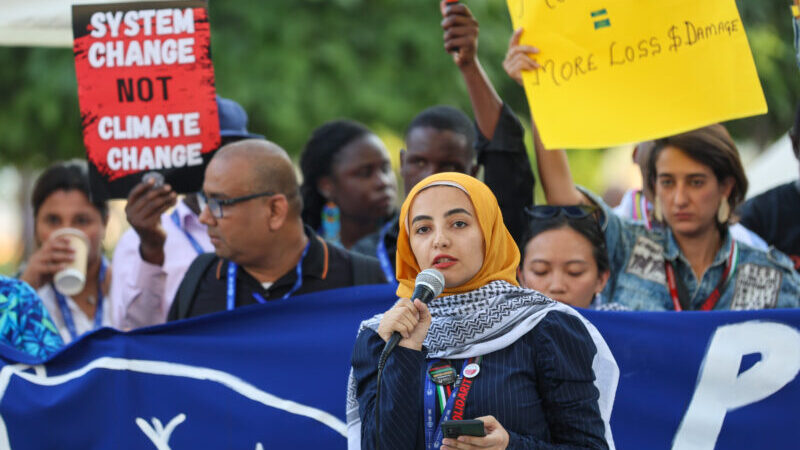If I had to sum up the first week of Cop28 in a word, I’d say… quiet?
Perhaps it’s inevitable that as Cops get bigger, the action is spread thinner.
It’s not just that the official negotiating agenda, since Paris, is increasingly dwarfed by the trade show.
On the sidelines too, there are only so many sectors you can announce new initiatives for. Only so many net zero targets. At this point, you get to the messy business of implementing them.
The global climate movement has come more single-minded than ever in its focus on a fast and fair fossil fuel phase-out. And it’s getting somewhere. A draft compromise text, for all its caveats, sticks with “phase out” not “phase down”.
But in the vast expanse of the Dubai Expo, that sense of purpose risks evaporating under the harsh desert sun. In a consensus-based process, petrostates could veto language that threatens their core business.
It might not matter if the deals being done on the sidelines were shifting the trillions of dollars needed into renewables and resilience. And maybe they are – not every transaction is press released.
It hardly looks that way from the UAE’s official – and therefore generous – estimate of funds mobilised though: $83 billion.
For context, that’s just over half of the $150bn Adnoc is forecast to invest in oil and gas production this decade, according to Global Witness. Adnoc disputed the analysis, but has never denied it is increasing production. And it’s just one of many oil majors.
Saudi Arabia, meanwhile, is promoting oil-guzzling vehicles across Africa, to prop up future demand.
To make phase-out stick, money needs to flow in the right direction. As ministers arrive to narrow down some 90 options in the global stocktake text, that is fundamental.
The latest headlines
- As fossil fuel phase-out gathers steam, resistance builds
- Don’t be fooled: CCS is no solution to oil and gas emissions – Laurence Tubiana and Emmanuel Guerin, European Climate Foundation
- Vietnam charts uncertain coal path as finance falls short
In brief
Another petrostate Cop? – Armenia said today that it would support Azerbaijan’s bid to host Cop29, as part of peace talks between the two enemies. That removes the major block to Azerbaijan’s candidacy. Azerbaijan gets two-thirds of its revenue from oil and gas, has a bad human rights record and has used expensive PR firms to weaponise environmental issues in its conflict with Armenia.
Putin in parallel – Russian president Vladimir Putin visited the UAE to talk trade and oil with Mohamed bin Zayed. His motorcade and cavalry escort stayed well clear of Cop28. The International Criminal Court has an arrest warrant for Putin over alleged war crimes but the UAE does not recognise its jurisdiction.
You raise me up – Ten multilateral development banks announced they will work together to support country platforms. These coordinate private and public finance around nationally-led investment programmes, for example coal-to-clean plans. This ODI blog explains.
Joined-up diplomacy – The German government has adopted its first strategy on climate foreign policy, aiming to bring trade and economic diplomacy in line with a 1.5C global warming pathway. It will expand a network of core climate embassies and hold regular coordinating meetings between ministers.
Mind the policy gap – UK is set to cut emissions 59% by 2030 from 1990 levels, according to policy analysis by Friends of the Earth, falling short of its 68% target. The gap between target and delivery has widened under the current government, they found.
Oil before zero – Uganda unveiled a net-zero by 2065 plan, advised by the International Energy Agency. The plan also foresees the expansion of oil production, which is set to begin in 2025. The country wants to end energy poverty by 2030.
